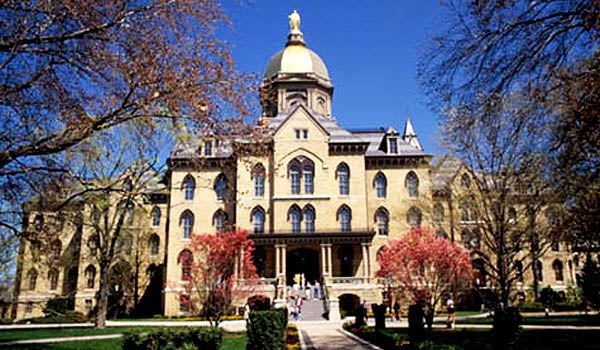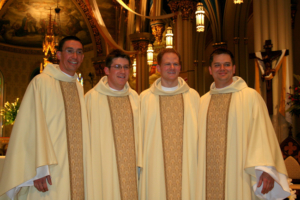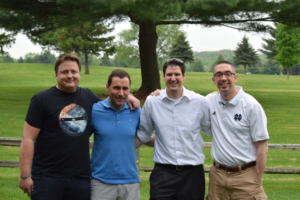All the way back to my sophomore year in high school, I had been thinking about becoming a priest, too. It was something in the back of my mind that I was a little anxious about. Not too many people are saying – from that early age – that they want to be a priest. So having that kind of clarity so early made me a little bit anxious. I mean, ‘What am I not seeing here?’ So I really tried to pursue these other opportunities. Eventually, I decided, ‘I have to come back and at least give this a shot. I have to give it the attention I’ve given to being a teacher or a doctor.’
I went and applied to the Moreau Seminary at the University of Notre Dame [after graduation]. It is a seminary run by the Congregation of Holy Cross [of which I am a member]. It is an order of men in particular that was founded in France back in the 1800s. The seminary itself was named after Father Basil Moreau, the founder of the Congregation of Holy Cross. What happened is that they sent a young priest by the name of Edward Sorin to the United States, who founded the University of Notre Dame… The congregation has about 1,500 priests and brothers throughout the world. We’re found in South America, East Africa, France, the United States, Bangladesh, [and] India.
I’d looked around at the varying options and the seminary here was very attractive to me. I was ultimately accepted, but I truly knew very little about the congregation and the University of Notre Dame. In fact, I had to look up Notre Dame on a map to figure out where exactly it was. When I came down, I was a little anxious. But I fell in love with the people who are here, the work being done at the University of Notre Dame, [and] also the different options available throughout the global citizenship of the world. So I decided to say “yes” to that and come down for a year [in 2000] to give it a shot. After a year, it was pretty clear to me that this was something that needed further pursuit.
I had taken classes here at the university largely in philosophy in preparation for my first master’s degree. During that time, I was just exposed to community life that we, as members of the Congregation of Holy Cross, lived, [such as] morning and evening prayer and mass together. I was exposed to the ministry that we have here at the university and also to parishes in the South Bend area. I, in particular, worked at the Juvenile Justice Center in South Bend, where I counseled teens who were going through some tough times. And I loved it! I loved the opportunity to live my life for others and to live my faith in such a clear and distinct matter. Everything that I was doing could, at some level, be wrapped in faith. And that was a big step for me. That wasn’t how I started in terms of being comfortable talking about what motivates me as a person who responds to God’s invitation to serve as a priest. That certainly took some time to articulate, but it was becoming clear for me in the first year.
At the conclusion of the first year, we take another year away in Colorado Springs. It’s called our Novitiate year (Our first year is called our Postulant Year). That second year is, in some respects, like spiritual boot camp. It has very regimented times of silence and work periods. It lasts an entire year. The intention is to really think deeply about what is it you’re called to do and is it with the Congregation of Holy Cross. That was an important year, because it crystallized and gave me time to reflect and think about what it is that I wanted to be and how it is that I felt I was being called. At the end of my second year, I took my first vow. As a priest, we take vows of poverty, chastity, and obedience.
The following year, I was responsible largely for schools. So I came back to the University of Notre Dame, where I began working on my Master’s of Divinity degree. It is a program that is intended to be both pastoral (meaning it gives seminarians and laymen the tools to counsel people) and theological (providing the knowledge and background on the faith that is required when working in the church). I worked on that for three years. During that time, I also took a break and worked in one of our parishes in Phoenix, Arizona. When I was there, I lived in one of the rectories, taught a baptism course, and I was responsible for a variety of projects. For example, we renovated a courtyard and added new lighting to a parking lot – and those were my responsibilities. It was interesting because when I was there, I got a real desire to understand the organizational and business side of these functions.
I thought to myself, ‘When you look at a parish that has a school attached to it, typically you have a multi-million dollar budget. You have personnel [and] a need for human resources.’ You have all this type of stuff, yet the training that our priests get doesn’t always line up with the requisite skills required. So I began to think, ‘I wonder if someday, maybe, I should think about getting an MBA?’ I just put it in the back of my mind, finished that year, and then came back and finished my Master’s of Divinity. When that wrapped up, I was ordained a priest a year later in April of 2007.
[After being ordained], I began serving as a hall rector at the University of Notre Dame. We have 29 residence halls on campus. And each hall has a rector – about half of them are priests or nuns. In other colleges, that would be similar to a hall director position. The person is in charge of really building the community in that particular hall. I was in Keough Hall…and I served in that capacity for six years. Each year, I had about 280 guys. And Notre Dame runs a stay-hall system. When you arrive as a freshman in a particular hall, you stay there. You wouldn’t move from one hall to another. Usually, your next move is off campus…I did that for six years [before moving to campus ministry].
I have a great love for working with students and the life of campus. Notre Dame’s campus ministry has a variety of moving parts. We’re the largest campus ministry in the country. And we also have a fairly sizable staff (35 employees and 10 students who serve as interns) for a not-for-profit. We make quite an impact as it relates to the wider campus.
When we talk about campus ministry, often times, the term that gets thrown out there is the “Pastor for Campus” – the person who is asked to provide the spiritual formation of faculty, staff, and students. Certainly, I do not do that alone…But what I’m asked to do is to look at campus from a macro perspective and assess how we’re maintaining our Catholic character – and how can we improve and grow and how can we provide new thoughts and insights. Again, I can’t emphasize this enough: You don’t do that alone. You do that with a lot of collaborators.
Mendoza was very attractive to me. One, Notre Dame provides an excellent business education. It seemed natural for me, since they were in my backyard, to talk to them first. What impressed me about them was the real sense of being driven by values. Certainly, I didn’t look at a whole load of executive MBA programs. When you walk into the Stayer Center, they have the mission adorned on the walls. There is a sense that values matter and they hope to educate us to be men and women who are ethical decision-makers, to be leaders in the modern era.








Questions about this article? Email us or leave a comment below.